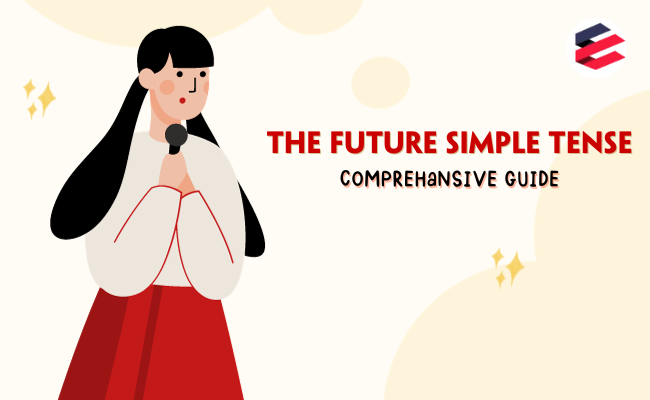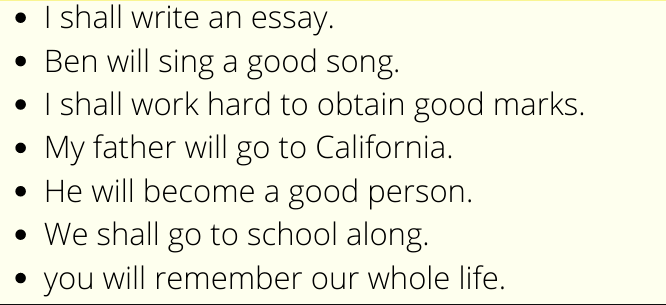Mastering the Future Simple Tense: A Comprehensive Guide
The future simple tense is a fundamental grammatical aspect of the English language that holds immense significance, especially in the context of the grammar for IELTS test. This tense allows us to convey future actions, plans, intentions, and predictions, making it an indispensable tool for effective communication. Given the importance of varied tenses in the IELTS test, mastering the future simple tense is crucial for showcasing language proficiency and achieving a higher score.
In this article, we will explore the definition, structure, usage, and roles of the future simple tense in the IELTS test, highlighting its impact on enhancing language complexity and grammatical accuracy.

1. Definition of the future simple tense
The future simple tense is a grammatical construction in the English language used to express actions or events that are anticipated to occur in the future. It’s a fundamental tense that allows us to describe plans, predictions, intentions, schedules, and spontaneous decisions that will happen at a later time.
The structure of the future simple tense typically involves the use of the base form of the main verb, often referred to as the infinitive form (e.g., “to go,” “to eat”), preceded by the auxiliary verb “will” or “shall” for the first person (singular or plural). The subject is placed before the auxiliary verb, providing a clear indication of who is performing the action.
2. The future simple tense form
The general structure of the future simple tense is as follows:
Affirmative:
Subject + will/shall + base form of the verb (infinitive)
Negative:
Subject + will not (won’t) / shall not (shan’t) + base form of the verb (infinitive)
Interrogative:
Will/Shall + subject + base form of the verb (infinitive)

3. Usage of the future simple tense
The future simple tense is a crucial grammatical structure in English, used to express actions or events that will occur at some point in the future. Understanding its usage is fundamental for effective communication and conveying various intentions related to the future. Here are the primary ways in which the future simple tense is used:
3.1. Predictions and Speculations
The future simple tense is often used to make predictions or express assumptions about the future based on present evidence or personal beliefs.
- It will rain tomorrow.
- She won’t be late; she’s very punctual.
3.2. Promises and Offers
The future simple tense is used to make promises or offer assistance in the future.
- I will help you with your homework.
- He will call you later today.
3.3. Scheduled Events
It is used to describe events or actions that are part of a timetable or schedule in the future.
- The flight will depart at 10 a.m.
- The seminar will take place next month.
3.4. Facts and Certainties
The future simple tense can be used to state certain facts or certainties about the future.
- The sun will rise in the east.
- Water will boil at 100 degrees Celsius at standard pressure.
3.5. Instant Decisions
It is used to make spontaneous decisions or offer immediate responses to situations.
- Oh, I left my phone at home; I will go back and get it.
- There’s a sale at the mall. I think I will go shopping today.
3.6. Expressions of Willingness or Determination:
The future simple tense can demonstrate one’s determination or willingness to do something in the future.
- I will do my best to succeed.
- She will strive for excellence in her career.
3.7. Offering Advice or Suggestions
The future simple tense is used to offer suggestions or give advice.
- You should tell her the truth; it will make things better.
- If you study regularly, you will perform well in the exams.
3.8. Expressions of Beliefs or Hopes:
It is used to express hopes, expectations, or beliefs about the future.
- I believe they will arrive soon.
- We hope they will have a safe journey.
In all these scenarios, the future simple tense enables clear communication about future actions or events, helping to convey intentions, predictions, promises, schedules, and more. It is a versatile tense that is widely used in both written and spoken English to discuss future circumstances and plans. Mastering its usage is vital for effective language expression.
>> Suggested article: past perfect continuous tense
4. Roles of future simple tense in the IELTS test
The future simple tense plays a significant role in the International English Language Testing System (IELTS) across various sections, including speaking, writing, listening, and reading. Demonstrating accurate and appropriate use of the future simple tense is crucial for achieving a higher score in the exam. Here are the specific roles of the future simple tense in the IELTS test:
4.1. Speaking Section
In the speaking section of the IELTS test, the future simple tense is essential for discussing future plans, making predictions, giving recommendations, and stating intentions. Using this tense appropriately showcases your language proficiency and ability to express thoughts and plans for the future.
Example:
Question: “What are your plans for the upcoming weekend?”
Answer: “I will visit my grandparents and spend time with them.”
4.2. Writing Section
In both the IELTS Writing Task 1 and Task 2, employing the future simple tense accurately is critical. It allows you to articulate future trends, make predictions, give suggestions, propose solutions, and discuss hypothetical scenarios. This usage demonstrates a higher level of language competency and complexity.
- Example (Task 1 – Academic): The graph indicates that the number of smartphone users will significantly increase in the coming years.
- Example (Task 2 – General/Academic): In the future, people will rely more on renewable energy sources to combat climate change.
4.3. Listening Section
In the IELTS listening section of the test, recognizing the future simple tense is essential for comprehending the information conveyed in conversations or lectures regarding future plans, schedules, predictions, or promises.
Example: In a listening passage, a speaker might say, “We will discuss the upcoming project details in the meeting tomorrow.”
4.4. Reading Section
Understanding the future simple tense in reading passages is crucial for comprehending the author’s intent, predictions, or statements about the future. It helps in extracting information and drawing inferences from the text.
Example: In a reading passage about technological advancements, a sentence might state, “In the future, artificial intelligence will revolutionize various industries.”
4.5. Grammar Assessment
In the IELTS exam, your command of different tenses, including the future simple tense, is evaluated. Accurate use of this tense demonstrates your grammatical range, coherence, and ability to convey future-related ideas effectively, which are significant assessment criteria.

5. Exercises of future simple tense
Exercise 1: Rewrite the sentences using the future simple tense.
- She reads a book every evening.
=> She will read a book every evening.
- They play soccer on Saturdays.
=> They will play soccer on Saturdays.
- I eat lunch at 12 PM.
=> I will eat lunch at 12 PM.
Exercise 2: Create a sentence using the future simple tense. Choose the correct verb and form it accordingly.
- He / visit his parents
=> He will visit his parents.
- We / travel to Paris
=> We will travel to Paris.
- She / complete the project
=> She will complete the project.
Exercise 3: Form negative sentences using the future simple tense.
- He will come to the party.
=> He will not (won’t) come to the party.
- I will send you the email.
=> I will not (won’t) send you the email.
Exercise 4:Ask questions using the future simple tense.
- They / attend the meeting
=> Will they attend the meeting?
- You / call me later
=> Will you call me later?
Exercise 5:Complete the dialogue using the future simple tense.
A: “What time __________ (the movie / start) tomorrow?”
B: “It __________ (start) at 7 PM.”
=> Answer:
A: “What time will the movie start tomorrow?”
B: “It will start at 7 PM.”
By practicing these exercises, you can reinforce your understanding of the future simple tense and use it effectively in various contexts and sentences.
The future simple tense, a key grammatical construct, is essential for articulating future events and ideas with precision and clarity. Its relevance extends to the IELTS test, where using this tense accurately and appropriately significantly impacts one’s language proficiency assessment. Mastery of the future simple tense enables test takers to accurately express predictions, plans, and intentions, thereby demonstrating their grammatical range and competence. This article has delved into the structure, usage, and influence of the future simple tense on the IELTS test, emphasizing its vital role in aiding candidates to attain a higher score and effectively communicate future-related concepts. Let’s take some IELTS practice test now!